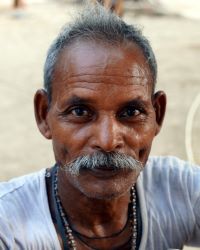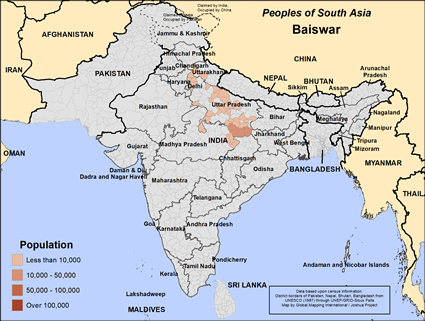Baiswar in India

Photo Source:
Copyrighted © 2026
Isudas All rights reserved. Used with permission |

Map Source:
People Group data: Omid. Map geography: UNESCO / GMI. Map Design: Joshua Project.
|
| People Name: | Baiswar |
| Country: | India |
| 10/40 Window: | Yes |
| Population: | 88,000 |
| World Population: | 88,000 |
| Primary Language: | Hindi |
| Primary Religion: | Hinduism |
| Christian Adherents: | 0.00 % |
| Evangelicals: | 0.00 % |
| Scripture: | Complete Bible |
| Ministry Resources: | Yes |
| Jesus Film: | Yes |
| Audio Recordings: | Yes |
| People Cluster: | South Asia Hindu - other |
| Affinity Bloc: | South Asian Peoples |
| Progress Level: |
|
Introduction / History
In the midst of this complexity can be found the Awadhi Baiswari. They are located predominantly in the states of Bihar, Madhya Pradesh, Uttar Pradesh, Kanpur, and Delhi.
They have two clans, namely Khandit and Bansit.
What Are Their Lives Like?
The Baiswar are one of the “Other Backward Castes” or OBCs for short. Their standing is not high but not low in India's caste system. They claim to have Rajput status, which is much higher than OBC. This is common in India; people tell the government they are from a lower status group to get government favors. They also tell their neighbors they are part of a high status group like the Rajputs to gain status on a local level.
What Are Their Beliefs?
The Awadhi Baiswari are largely Hindu and follow basic Hindu customs and traditions. The term "Hinduism" came into use about 1200 A.D., but clearly identifying what Hindus believe is difficult. The religion has no founder, no prophet, and no instructional structure. It is a way of living much more than a theology; it is a philosophy more than a religion. Contrary to popular belief in the West, Hinduism is not an ancient, fixed set of beliefs. It is, rather, a body of customs, practices, and beliefs that go through major changes every few hundred years.
The majority, but not all, of Hindus believe in a supreme being. Some respect all life and eat only vegetables, while others will gladly eat meat from sacrifices in the temple. To some, their religion is highly personal; to others, it is impersonal. A belief in reincarnation (continual cycle of death and rebirth) is one of the few unifying features of Hinduism.
What Are Their Needs?
Being one of the major language groups, the Awadhi already have the Bible and the JESUS Film available in their own language. However, few have taken the step of faith that would allow Jesus to bless them in this life and for eternity.
Prayer Points
Pray for Awadhi Baiswari people to have the spiritual hunger it takes to seek, find and embrace the only savior, Jesus Christ.
Ask the Lord of the harvest to send loving laborers to work among the Awadhi Baiswari of India.
Ask the Holy Spirit to give appropriate and creative ideas for evangelism to those reaching the Awadhi for Christ.
Ask the Lord to bring forth a vigorous Awadhi Baiswari church that will plant more churches.